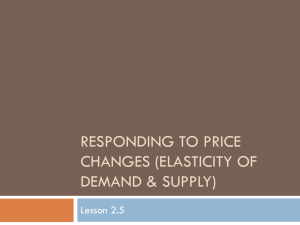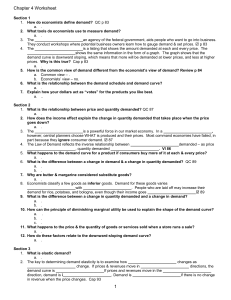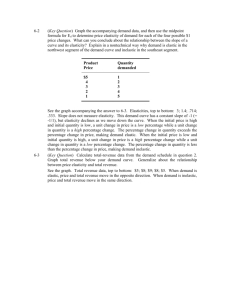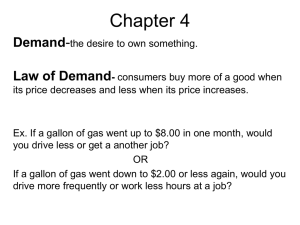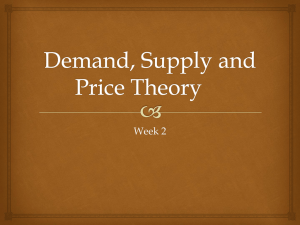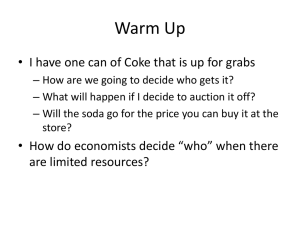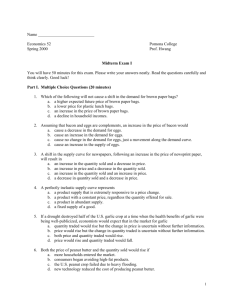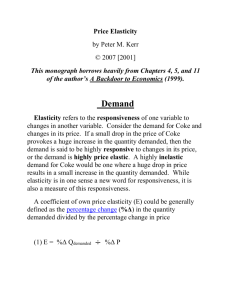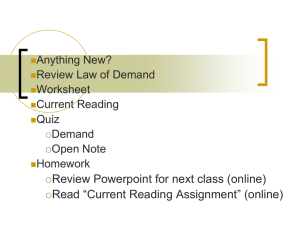Supply & Demand
advertisement
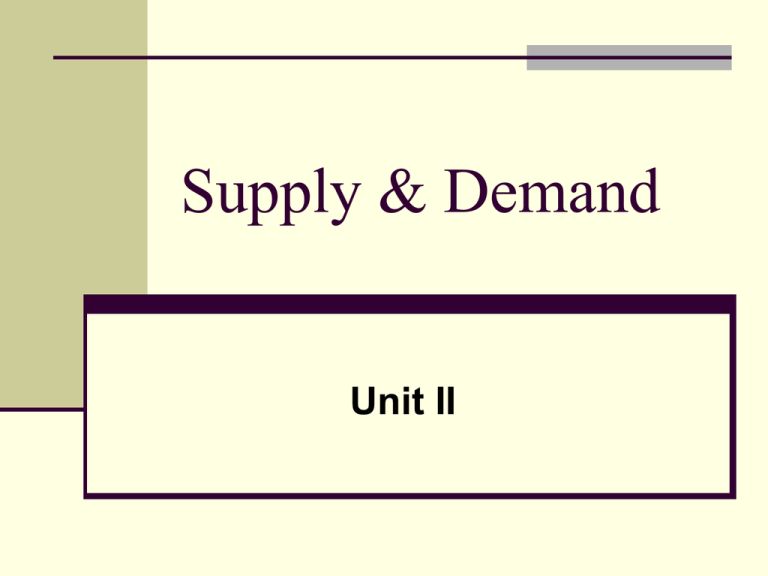
Supply & Demand Unit II Essential Question: How are prices set ???? Seller ? Buyer? Both Buyer and Seller Setting an Economy’s Price System To understand how a nation’s economy functions it is important to understand the nation’s price system The forces that determine price are called the forces of supply and demand The place where these two forces meet is called the marketplace Marketplace Marketplace is a mechanism that brings together buyers and sellers of a particular good and service to establish a market or retail price Stock market sets stock prices NASDAQ is an “electronic” marketplace Commodities market sets price of corn, wheat, etc. Demand Demand is a schedule which shows the various amounts of a product that consumers are willing and able to buy at each price during a specified time periodOTBE. e.g. Swimming suits have a different price and quantity demanded in summer vs. winter Law of Demand Law of Demand says that as the price of an item decreases, the quantity demanded will increase; and, as the price of an item increases, the quantity demanded will decrease The quantity demanded varies inversely with the price Demand Curve Demand Curve is a line graph that shows the amount of a product that will be purchased at each price; it shows an inverse relationship and is always downsloping D Qd Remember: A change along the curve indicates a change in price and a change in quantity demanded A change of the curve (right or left) indicates an across the board change in demand Supply Supply is a schedule which shows the amounts of a good or service a producer is willing and able to make available at each price during a specified time period Law of Supply states that the quantity of a commodity supplied varies directly with its price: the number of goods and services offered for sale increases as the price increases. Supply Curve Supply Curve will always be upsloping. S Equilibrium Price Equilibrium Price (also called the Market price) is the price at which goods and services may actually be bought and sold. Equilibrium Price is where quantity demanded is equal to the quantity supplied Market in Wheat Game S EP D Remember……….. A change along the curve indicates a change in price and a change in quantity supplied A change of the curve (right or left) indicates an across the board change in supply What’s this “across the board” stuff have we been talking about ? What on earth does we mean ? Aggregate (Market) Demand What events would increase or decrease the aggregate or market demand for goods and services “across the board” At every price range – generic Shaw’s brand ice cream to Ben and Jerry’s premium brand ! 1. Seasonality More lemonade will be demanded More bathing suits will be demanded More sun tan lotion will be demanded 2. Trends Advertising creates trends Gap Everybody in vests! Everybody in leather Everybody in stripes Some advertising can decrease demand SUV = Terrorism 3. Change in Income A raise in income will increase demand for superior goods ( Rolex) and decrease demand for inferior goods ( Timex watch) Conversely, a decrease in income will increase demand for inferior goods ( Timex) and decrease demand for superior goods ( Rolex) 4. Expectations If the Farmer’s Almanac forecasts a cold winter people may demand more snow tires and rock salt 5. Price of Related Goods Substitute Goods Complementary Goods A rise in the price of one An increase in the (e.g. butter) may increase the demand for the substitute ( margarine) This is a direct relationship price of one good ( e.g cameras) will decrease the demand for the complementary good (film/memory cards). This is an inverse relationship 6. Demographics Number and Kinds of Buyers in the Market can change demand Baby Boomers are getting ready to retires Increased Demand for: More housing in Florida and Arizona Assisted Living Complexes Walkers Wheelchairs ..and they are called “Determinants of Aggregate Supply” Just as there are events that can cause demand “across the board” -at every price level to change….there are also events that can cause supply “across the board”- at every price level- to change ! Determinants of Supply What could cause a huge increase or decrease in supply across the board ( and a change in price is not a factor !) Resource prices ( raw materials) Technology (produce more products faster & more efficiently Taxes Subsidies ( Gov’t grants) Related Goods ( e.g corn, wheat) Expectations Number of Sellers in the Market How much coffee can you drink ? One cup, two, three, four ? How does Dunkin Donuts get you to buy more coffee after lunch ? They offer you a deal…buy a large coffee, get a free muffin or donut Dunkin Donuts knows ALL about the Principle of Diminishing Marginal Utility !!! Principle of Marginal Utility Utility is the measure of satisfaction that one gets from the use of a good or service Marginal Utility is the degree of satisfaction a consumer gets from each additional purchase of a product ( marginal in economics means “additional”) Principle of Diminishing Marginal Utility explains spending patterns of customers and states that each additional purchase of a product or service by a given customer will be less satisfying than the previous purchase Elasticity of Demand Elasticity of Demand describes the percentage change in quantity demanded that follows a price change Elasticity of Demand Demand is elastic if a rise in price results in a large drop in demand and demand is inelastic if a rise in price results in a relatively small or no drop in demand Steak: Elastic or Inelastic ? Elastic Why? People as a whole can do without steak and will substitute chicken or other protein for expensive steak Milk: Elastic or Inelastic ? Inelastic Why? The population as a whole can do without steak….but can not do as easily without milk…especially families with children Gasoline: Elastic or Inelastic ? What Products are Subject to Elastic Demand ? Luxury Items – Most customers want luxuries and will consider buying them if price drops If Price Represents a Large Portion of Family Income e.g. Mortgage Rates drop from 6.5 to 5.5% people will “refinance” Availability of Substitute Items e.g. Steak /chicken Durable Goods Computers, cars, washers, dryers will be in greater demand if the price drops Perfectly Elastic Demand Curve Refers to a situation Price where a small or very $20 small price reduction causes buyers to increase purchases from $15 0 to all they can get E.g. Foreign currency $10 ( FX Market) $5 Miniscule changes in currency exchange rate would prompt FX brokers $0 to buy (or sell !) large amounts of money Qd 0 2 4 6 8 10 Quantity Demanded What Products are Subject to “Inelastic Demand”? Necessities (milk, gasoline) Drugs Legal (heart medicine antibiotics) Illegal (heroin, cocaine) Products with no good substitute insulin, cancer drugs, etc. salt in Middle Ages (preservative) Perfectly Inelastic Demand Curve Price Refers to a situation where no change takes place in Quantity demanded as a result of a change in price Examples: Diabetic – insulin Addict - heroin $20 $15 $10 $5 0 Qd 0 2 4 6 8 10 Quantity Demanded of Insulin Elastic ? Inelastic? Formula for Elasticity = % of Change in Qd % of Change in Price 1) 60-48 = 12 = .2 X 100 = 20 60 60 2) $10- $11 = -.1 X100 = 10 $10 3) % Change in Qd 20 = 2 % Change in Price 10 4) 2 > 1 Change is Elastic Q. Any other Way to Determine Elasticity of Demand ? A. Total Revenue ! P X Old Price New Price $ 40 X Q = 33,781 = $ 50 = TR $1,354,840 $ 1,250,000 How many fans showed up? $1,250,000 / $ 50 = 25,000 fans showed up Q. Was demand elastic or inelastic ? A. Elastic ! If all the fans had showed up, the TR would have been $1,693,550 ! What could determine elasticity for Red Sox ? Why is Elasticity of Demand Important ? What happens if a florist increases the price of roses 400 % in October ? Will sales go up or down ? A. Probably, down What happens if a florist increases the price of roses on February 14th? Will sales go down or up? A. Probably up ( OTBE !) Why ? Frantic husbands and boyfriends will pay exorbitant prices for a dozen roses on Valentine’s Day – if they know what’s good for them ! ! Elasticity of Supply Like Demand, Supply is subject to elasticity If a change in price produces only a small change in supply, it is said to be inelastic What goods are subject to supply elasticity? Manufactured goods are more subject to elasticity of supply than goods produced by nature Skateboard manufacturers can get employees to produce more skateboards, but farmers can’t force cows to produce more milk or trees to grow faster Market Disequilibrium Price Ceilings and Price Floors cause market disequilibrium because they disrupt the natural dynamics of the marketplace (supply and demand) Price Floors: Price floor are prices below which it is illegal to buy or sell. Federal Min Wage = $7.25/hr RI State Min Wage= $7.40/hr Dilemma: Some argue that McDonald’s Worker and other fast food workers generally earn minimum wage minimum wage laws disrupt the equilibrium in the market and actually increase unemployment Why? left to the forces of supply and demand more workers would be hired at LOWER wages, decreasing unemployment. Ohio Kansas States with minimum wage rates higher than the Federal States with no minimum wage law States with minimum wage rates the same as the Federal States with minimum wage rates lower than the Federal American Samoa has special minimum wage rates Price Ceilings: Prices above which it is illegal to buy or sell Examples: Rent controlled apartment buildings in cities Certain goods and services during emergencies. Dilemma: Since rents are frozen, many landlords cannot keep up with the rising costs of maintenance – which have not been frozen ! They stand in the way of market forces of supply and demand


